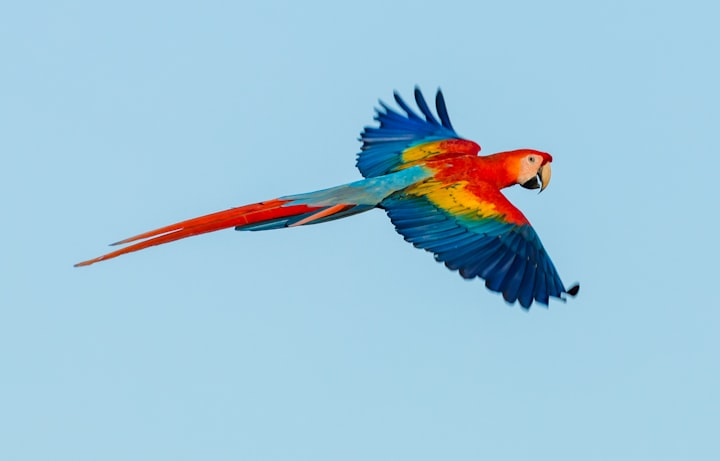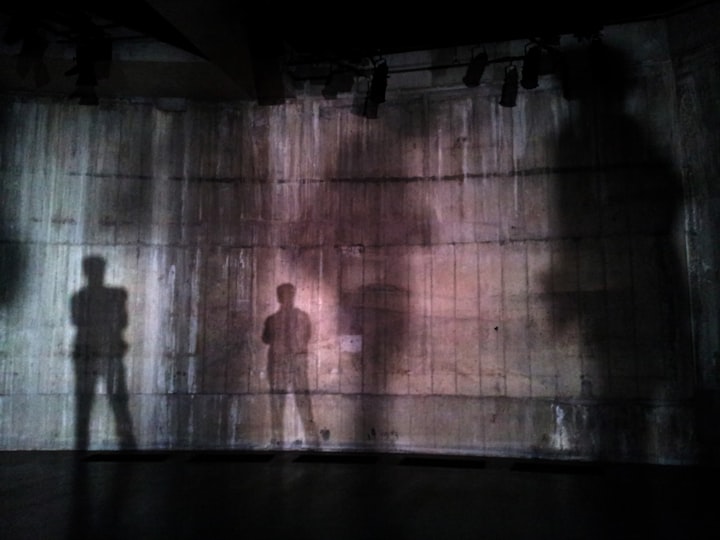Days of the Guacamaya Roja
The Scarlet Macaw

My name is Julio Martinez and as I begin to tell you, know I was once a taker of parrots. The guacamaya roja, the scarlet macaw. Yes, a beauty. Red, green, yellow, blue. We took them down from the trees, the eggs, the birds flown into nets, their feathers, whatever we could get. It wasn't against the law at first, you know. There were so many, nobody could see the end of them.
The birds, starting around four years old, they lay two, maybe three eggs in a nest. From there they raise those chicks for one, two years before having another nest. They stay together all their lives. Might be 50 years, like a golden wedding, see? If it’s me, I celebrate with a cake, some music, my bride. If it’s a bird, they’re probably glad to have food to eat and the trees they fly between but they are the same, it’s one and one all the way. Oye mi hijito, hear what I say. Maybe they are better than some people that way.
I didn’t know about the lifetime at first when I was takin’ them, oh no. There was a lot I didn’t know. Sleep wit’ yo’ own eye we say. You get to know t’ings for yourself not what other people tell you.
Those birds, they used to be all over. There were thousands, like bright, noisy flowers in the sky. You could hear them, screeching and chattering, a whole village. Now they’ve been taken so long, there’s not more than a couple hundred in the whole country. They aren’t going to last in the forest, my grandchildren, I thought at first they might never see one.
When I started taking them, it was anything to make a buck around here, you know? The forest is a provider to families like mine. There's food and money to be made. It was ours long before it belonged to the government or the people as they say. I could make some good money, enough to feed my family and make sure my kids could get to go to school 'til they were 14 at least.
One thing we could take was the Xate palm. There’s a lot of travel through the forest to get these leaves. Now the xateros and the soldiers, they argue about where the border is. When there weren't any worries about who owned the forest people just took what they needed. It was a life of hardship, but without the chance of getting killed by gunfire.
You know your Palm Sundays and your funerals up in the US? Well, they’ve pretty much destroyed all the palms in Guatemala and now the xateros cross into Belize. Kill a tree for a tradition seems to be the American way, ya? Stripping the place bare. But there’s no work so cast an eye in our direction.
But the birds, as I said, there were hundreds. I'd go out in the forest and I'd find a good area, they stay all together those birds. You could hear them for a mile. I'd get my rope out and climb, climb up to a nest. Take the chicks, put them in my shirt, climb down, bring them over to meet my contact, and get paid. The parents, they'd fly around crying, but they are just birds, I think. What can they know? They'll get over it.
Then I didn't know that most of those chicks die, something like nine out of ten would die when you take them. The little ones don't get taken care of the way those parents would do. They get taped up in boxes and mailed, stuffed in people's socks to be walked for miles, all kinds of roughness and fear.
One day my kids came home from school, they were talking about the birds and how there weren't many left, how it wasn't legal to take them. They didn't know then what I was doing.
The next day I fell.
I was climbing down a tree when the rope broke. I had two chicks tucked into my shirt in the front. The parents were flying around like always, trying to get my head. I was about eight feet off the ground when it happened. I was lucky. I landed on my back in a soft spot, but still, I don't know how long I was out. I just lay there a good long while with the breath knocked out of me, not moving. The chicks were sitting on my chest, but they had wiggled out of my shirt. The parents were still flying around.
I probably laid there on my back for another hour before I tried to move, just looking up at that tree hole where their nest had been. One of the birds lit down on the ground and brought some food for the chicks. They were calling out by then. It looked me in the eye first and then just went on about its business. I kinda' laughed 'cause it was the look my mom would give me when she knew I'd done something wrong, but my punishment was already handed out. Cut stick fo broke you own back we say. I hoped that mine wasn't that time.
After some long time on the ground, I tried to move a bit and found I could. It hurt I can tell you, but not sharp anywhere on me. I sat me up slowly and put the chicks back in my shirt with the parents still circling around and crying. Then my heart sank down in my chest because I knew what I had to do, and that was to bring those two back to their mum and dad up that tree.
That mother and dad by then, they were treatin' me like El Tata Duende, the one that lures the children out into the forest and steals them away. I guess when you see it from their point of view, that's who I was.
I had a bit of extra rope in my pack to splice the two broken ends together. It took me an hour, and all the time, those two parents came and fed those little ones. We got to be neighbors a bit, so I told them my name and all about my family while I worked. One of those parents I saw, had a metal band around a leg. I guess someone was tracking it all right.
After I finished my splice and gave it a pretty thorough test around the bottom of the tree, I looked up. This time, the tree looked about twice as tall as before. I tucked those chicks back safe into my shirt and started the climb again, again with two birds beating me 'round the head. It seemed like the longest climb I'd ever made.
Finally, I tucked those two back in their hole and made it down. It was gettin' dark, so I had to make it back to my own family.
The next day I was tired and sore. I laid low around the house and fixed a few things. When the kids came home from school, they brought a visitor, a scientist doing some research. A few of them had talked in school the day before. My kids had told them how well I knew the forest. They had a lot of questions about how people here viewed the forest, how we lived in the area, what we did to survive. It was all pretty 'round about, not pointing fingers at me directly, but digging for information.
Then they said they needed people to help look for parrots and guard them during the nesting season each year. I almost fell off my chair. The amount of money they were offering would mean I'd be able to keep my kids in school and fed. Did I know where any of the parrots might be likely to be? Well, yeah, but I didn't give up that information. I said I'd like to think about it a day. I had a lot of questions too, like how long this job was for, how dangerous, what exactly I'd have to do.
I checked them out the next day. It seemed they were on the up and up, so when they returned, I was ready.
They set us up in teams, with a couple of other men nearby and one or two researchers. My team, I brought out to the very birds I put back. We were all kind of laughing up our sleeves at first, but it sure did make it better when we got that first payment. Our job was to guard that tree. We sat under that nest in shifts morning and night for months while those chicks grew. When their parents taught them to fly, we could safely leave them. I learned a lot about the parrots, and about the forest from a few of the people who weren't even from around here. I guess they learned from me too, even though I only made it to age fourteen in school myself. I know the vines that will give water and yield medicines, and the palms that will give us food.
Those parents got to know us pretty well. I think we were almost like a part of the family after a while. One day early on, one of the researchers caught a glimpse of the metal band and tracked down the people who had put it there. They were in Red Bank Village, where the birds come down out of the mountains to eat fruit for a few months each year. They were glad to know that couple was still out there. That bird hadn't been spotted for a while.
Nighttime, when we camped around the tree in our hammocks and in the tents was usually peaceful. Alejandro had a beat-up old guitar, so he played, and Ravi had a wood flute. We improvised a few instruments from things laying around the camp and off we'd go, singing all the songs we knew. We were there so long, after a while one of those parents got to singing a few notes with us. It was an old Mayan song, so old that I wondered if the bird remembered it from those days.
One night we were camped there cooking our dinner around the fire when we heard the gunfire a way off. That was the closest we came to the violence that first year. We were lucky. You could tell that eyes were watching us in the forest. You could feel them on you, and you'd turn around quick, but never see them. Maybe the profits weren't so thin that they needed to tackle a big group of us.
So far, since I started work protecting, we've saved a few parrots each year this same way. The parrots we began protecting have had three more nests so far. Their colony is growing slowly, but all around us, other birds are losing ground.
My kids are grown. They moved to the city, but they come back home, and their kids stay with us in the summer. We teach them about caring for these birds. The first chicks of that first couple are grown too. I like to think we have a special relationship, that we know each other pretty well now. The guacamaya roja are a part of our culture and we are a part of theirs. It was sleeping and dreaming through us, a part of ourselves that we almost forgot in the song of the modern days. We can find and keep the best part of ourselves if we are careful. Now that I see clearly, I can care.
*** *** ***
While this story and its narrator are entirely fictional, deforestation and poaching are the two primary problems facing the Scarlet Macaw and other Central American bird species. In Belize, there are now less than 350 Scarlet Macaws in the wild. The names given in the story were chosen from a list of the most common names in Belize.
This story was originally written in October 2021 on Vocal Media as a writing challenge with Untamed Photographer to raise money for the Belize Wildlife Clinic & Referral Clinic https://belizewildlifeclinic.org
Other organizations attempting to save the Scarlet Macaw in the wild are noted below.
https://belizebirdconservancy.org/scarlet-macaw-project
Below: A documentary film about the US Fish and Wildlife efforts to preserve the Scarlet Macaw in Honduras.
About the Creator
Natalie Wilkinson
Writing. Woven and Printed Textile Design. Architectural Drafting. Learning Japanese. Gardening. Not necessarily in that order.
IG: @maisonette _textiles






Comments
There are no comments for this story
Be the first to respond and start the conversation.